
Getting into the workforce can be overwhelming, especially if it’s your first job. Many people start with the belief that they need to have experience to get a job.
Although it’s essential to have the experience to secure a job, there are a few ways to land a job without having the necessary expertise.
Getting a job without experience could be difficult, but you can greatly enhance your chances by following a 5-step process – (1) Build Your Network (2) Prepare a list of activities you’ve done (3) Build Work Experience (4) Acquire New Skills (5) Look for Transferable Skills.

Approaching your job search with the right strategy and showing employers your enthusiasm and skills are essential. Here are some ways you can grab that job offer without relevant experience.
Build Your Network to Enhance Your Chances of Getting a Job Without Experience

Networking is one of the most effective ways to land you a job. It’s simple psychology – no employer wants to take chances. Interview performance is a learned skill that can be perfected through consistent practice.
It’s not a guarantee that a candidate who performs very well in the interview will exhibit the same performance in the actual job. Employers know this and do not want to take chances on someone solely based on their interview performance.
When an employee of an organization recommends you to a job, it’s like a personal guarantee from a person who’s already part of the organization and knows what it takes to perform the job duties. That’s why word-of-mouth recommendations are so valuable to the employer – it’s less risky and more reliable.
And that’s why networking is so important. Moreover, if you’re trying to get a job without experience, take networking seriously – this alone could get that job for you.
Networking takes time.
It takes consistent and deliberate efforts to build effective relationships. First, make a list of all the people you know from various places such as your school, college, social networking site, relatives, friends, acquaintances, etc.
Then, list all the people you have met through these connections. These people can help you connect with those looking for a new job. Take deliberate and consistent action daily to build your network – start today.
In today’s world, Networking and Building Relationships is the cornerstone of getting interview calls and job offers. Make networking your priority.
Prepare a List of All Activities You’ve Done So Far, That Could Become Your Relevant Experience.

It’s common to think that you don’t have relevant work experience. But work experience that you can include in your resume does not mean corporate work experience.
You might have done the work in a different setting but may not realize that.
For example, if you are applying for an Event Management role, the critical skills required are Planning, Organizing, Managing, and Coordinating various events. And if you’re applying for your first job, you might not have the corporate experience to list.
Take a moment to scan through the activities you’ve performed in your school or college. Were there any school events or tours or fairs or sports activities that you’d helped to coordinate and conduct? What are the activities you planned and executed? What were the results?
Think through and prepare a list of all such experiences, which all count towards valid and relevant work experience for the job.
Similarly, if you’re applying for an IT website designer job, you may not have had experience working in an IT company before. But think through your school/college days. Have you learned relevant courses? Have you done personal projects as part of learning the course? Have you built personal websites?
All these are relevant experiences that you could showcase in your resume and count as relevant job experiences. You need to take some time to think through and adequately structure your experiences and list them in your resume.
During the interview, talk enthusiastically about your personal projects and the skills you’ve acquired, and how you could bring value to the organization with your knowledge and expertise.
Think through all the activities you’ve done in school, college, community, and events you’ve attended. You would be surprised to see a list of related experiences, that you might not have thought about before.
Start Building Your Work Experience

Be willing to start from scratch – take up unpaid jobs to build your experience, develop professional networks and acquire that crucial industry knowledge that would benefit you in the long run.
If you’re a student, there are great opportunities for internships where you could find work in that particular industry.
This has many benefits – you get freely trained by the company during your internship and acquire the necessary skills and work experience to convert this into a long-term career prospect. You could also get first-hand insights into whether this job fits into your long-term career vision.
Another way to develop skills in your field of choice is by volunteering. This can help you land a job title that fits your resume and provide additional work experience. Be sure to include the organization’s recommendation letter.
Work experience does not solely mean the experience in your prior corporate jobs. Your personal projects, portfolios and experience acquired in volunteering and community activities are all part of your work experience.
Keep Learning – Take Courses and Acquire New Skills

Completing online courses is a wonderful strategy that enhances your chances of getting a job without work experience. Knowledge gained needs to be applied to acquire the skills – build your personal portfolio of projects that you can showcase as your prior experience.
There are thousands of courses that can help you get started in various industries. If you’re looking to learn more about coding, online boot camps are a great way to get started. However, make sure that you take the right course for your situation.
Unfortunately, many expensive certification programs are just used to attract job seekers. These programs are usually not worth the money and are usually not worth the effort.
Focus on building skills and doing real-time projects, which you can include in your resume as experience. Also, you would be able to effectively answer interview questions dealing with real-world problems, only if you have done projects yourself.
Getting certified is good, but don’t go overboard with certifications.
Do actual projects by applying what you’ve learned; that should always be your final objective. This is how you acquire all the essential skills to apply and resolve problems faced by companies in the real world.
Never stop learning. Continue to upgrade yourself and acquire new skills even after you’ve grabbed the job.
Look for Transferable Skills You Can Add to Your Resume, Relevant to that Job Position

Transferable skills refer to the skills you’ve acquired from your prior experience, which you could reuse in your new role. They usually apply when you’re changing careers.
There are quite a number of transferable skills that could be applied in a variety of jobs, even across different industry or domain. Skills like communication and problem-solving are the best examples, which you could use in almost every job.
There are two types of transferable skills – Hard skills and Soft skills.
Hard skills are the specific skills that you apply in your current job, like Engineering, Business Analytics, Tech skills, etc. If you’re switching jobs to another company within the same industry, these skills become transferable. But these skills don’t apply if you’re moving to a different industry.
Soft skills, on the other hand, are not industry-specific. Soft skills like communication skills, problem-solving, teamwork, leadership, creativity, etc can be utilized in almost every industry.
Depending on your job switch, you may wish to highlight the most important transferable skills for the particular job you’re applying for. That’s why it’s essential to have a customized resume tailored to every job opening to which you apply.
Prepare a list of transferable skills that you acquired over the years, which you can include in your resume, and which applies to that job position.
Final Thoughts
Having the right mindset is very crucial to achieving your dreams.
Start by doing what’s necessary; then do what’s possible, and suddenly you’re doing the impossible”.
Francis of Assissi
Initially, it might seem impossible to get a job without experience. Following the tips in this article, you will realize that there are many opportunities to enhance your chances of grabbing that job offer and starting your journey toward a highly successful career.






